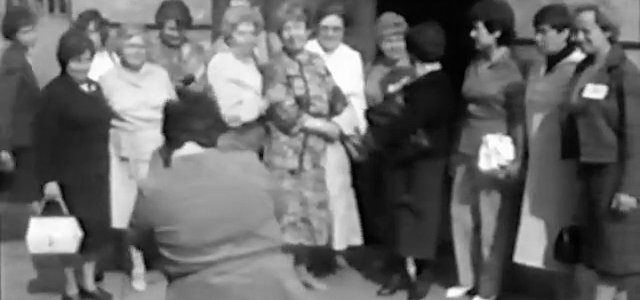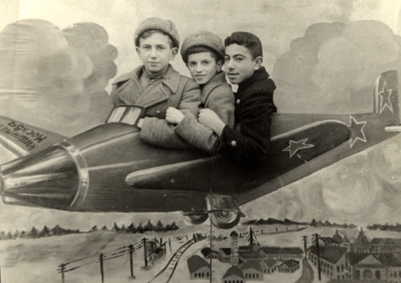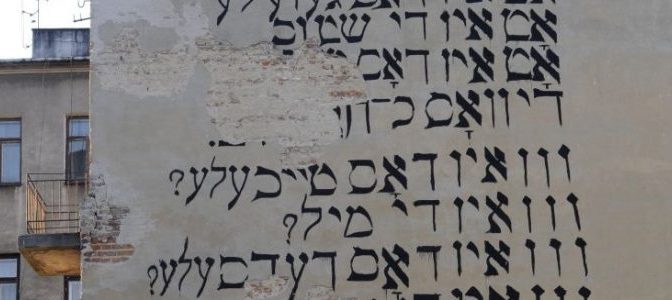A lecture by Agnieszka Wierzcholska (Free University of Berlin) in the frame of the seminar on Modern Jewish History of the Institute of Contemporary History (AV ČR) and CEFRES in partnership with the Masaryk Institute (AV ČR).
Where: CEFRES library, Na Florenci 3, 110 00 Prague 1
When: from 5:30 pm to 7:00 pm
Language: English
Abstract
Tarnów in southern Poland has been a Polish-Jewish town for centuries. Prior to the Second World War almost 50% of the town’s inhabitants were Jewish and the remaining half were Catholics. Relations between Jews and non-Jews were a normal part of everyday life among neighbors, schoolmates, and in local politics. During the Shoah the murder of the town’s Jews took place on the streets of the town, right before the eyes of the non-Jewish neighbors. Of the 25,000 Jews who lived in Tarnów in 1939, only a mere thousand returned, and only a few hundred stayed.
What happens to a town where the German occupier destroyed the Polish-Jewish Lebenswelt? The social fabric changed dramatically since 1939 and the local community became an occupied society. The antisemitism that arose in the town in the late 1930s intertwined with German anti-Jewish policies in many ways. Due to the proximity of violence, non-Jewish Poles were implicated in the Shoah. On the other hand, we must also ask which local networks proved to be resilient, what friendships turned out to be lifesaving, and what contacts proved to be dangerous? Finally, what happened to the town when the German occupier left in January 1945 and half of its population – the Jewish part – was gone?
This talk retraces the everyday life of a Polish Jewish town, bridging the caesuras of World War Two in order to retrace the continuities within the upheavals and to reiterate individual life stories.
A lecture by Marcin Wodziński (Wroclaw University) in the frame of the seminar on Modern Jewish History of the Institute of Contemporary History (AV ČR) and CEFRES in partnership with the Masaryk Institute (AV ČR).
Where: CEFRES library, Na Florenci 3, 110 00 Prague 1
When: from 5:30 pm to 7 pm
Language: English
Abstract
What is Hasidism? Why do we know so little about one of the most intensively- researched phenomena in Jewish history? Which historiographical presumptions hinder the development of our knowledge about Hasidism? How is it related to the basis of sources and methodological approaches? What would Hasidism look like if approached from a different, anti-elitist perspective, from a provincial shtibl and not a tsadik’s court?
These questions will build the core of the talk by Professor Wodziński, key expert on Hasidism, author of Hasidism. Key Questions (Oxford University Press, 2018) and editor of the Historical Atlas of Hasidism (Princeton University Press, 2017).
A lecture by Karolina Szymaniak (Wroclaw University) in the frame of the seminar on Modern Jewish History of the Institute of Contemporary History (AV ČR) and CEFRES in partnership with the Masaryk Institute (AV ČR).
Where: CEFRES library, Na Florenci 3, 110 00 Prague 1
When: from 5:30 pm to 7 pm
Language: English
Abstract
When in 1988 poet Marcin Świetlicki formulated in the now famous poem his sharp criticism of the rhetorics of cultural opposition and its possession by history, he wrote: „Instead of saying: I have a toothache, I’m/ hungry, I’m lonely (…)/ they say quietly: Wanda/ Wasilewska, Cyprian Kamil Norwid,/ Józef Piłsudski, the Ukraine, Lithuania/ Thomas Mann, the Bible, and at the end a little something/ in Yiddish” (trans. W. Martin). As Eugenia Prokop-Janiec has shown, in the 1980s Yiddish came to be treated as a part of the code of independent culture, and investment with it became a form of resistance. But what was this undefined „little something” and what tradition was underlying its presence in the Polish discourse? What meaning and content was it endowed with? How does this tradition bear on contemporary representations of the Jewish Polish past and the way we write the history of culture in Poland?
The talk is a discussion of existing and possible approaches to the study of Yiddish Polish cultural contacts in the 20th century, their limits, and ramifications. It is a working presentation of an on-going project. By turning to the history of Yiddish Polish cultural relations and their discourse, and interpreting them through a different lens of cultural studies, the study also seeks to think other ways of conceptualizing history of culture in Poland. An approach that includes the minority perspectives and respects their independence, and create a space where the „little something” turns into a complex polyphonic phenomenon in its own rights.

A lecture by Peter Hallama (EHESS, Paris) in the frame of the seminar on Modern Jewish History of the Institute of Contemporary History (AV ČR) and CEFRES in partnership with the Masaryk Institute (AV ČR).
Where: CEFRES library, Na Florenci 3, 110 00 Prague 1
When: from 5 pm to 6:30 pm
Language: English
Abstract
This lecture will reconsider the growing interest in Jewish culture, religion, and history in the last decade of State Socialism in Czechoslovakia. It will focus on three aspects: generational conflicts within the Jewish community and the younger generation’s questioning of their families’ pasts and religiousness; the dissident appropriations of Jewish history and culture; and the beginning of nostalgia for “Mitteleuropa”, as opposed to the homogenizing tendencies of the Communist régime to an ideal of cultural, national, and religious heterogeneity. This lecture will therefore discuss some of the principal ways that Czech Jews and non-Jews re-defined Jewishness, and will seek to avoid a normative assessment of “virtual” Jewish identity as opposed to “authentic.”

A lecture by Diana Dumitru (Ion Creanga State Pedagogical Institute, Chisinau) in the frame of the seminar on Modern Jewish History of the Institute of Contemporary History (AV ČR) and CEFRES in partnership with the Masaryk Institute (AV ČR)..
Where: CEFRES library, Na Florenci 3, 110 00 Prague 1
When: from 5 pm to 6:30 pm
Language: English
The history of Soviet Jews in the postwar era is traditionally viewed as a dark period, filled with repression, expulsion of Jews from the state machinery, and the coexistence of mass-based and state-supported antisemitism. An analysis of the Jewish situation in Soviet Moldavia challenges this monolithic view of the Jewish experience under late Stalinism, and demonstrates that local postwar circumstances encouraged a vigorous promotion of Jews in key positions in this republic.
Simultaneously, the presentation will seek to illuminate the impact of this new public visibility of Jews on the triangular relation between Jews, the state/party institutions, and non-Jews in Soviet Moldavia.
Illustration: Moses Chubat and his Friends (Kishinev 1947)

A lecture by Karolina Szymaniak (Wrocław University) in the frame of the seminar on Modern Jewish History of the Institute of Contemporary History (AV ČR) and CEFRES in partnership with the Masaryk Institute (AV ČR).
Where: CEFRES library, Na Florenci 3, 110 00 Prague 1
When: from 5 pm to 6:30 pm
Language: English
Abstract
When in 1988 poet Marcin Świetlicki formulated in the now famous poem his sharp criticism of the rhetorics of cultural opposition and its possession by history, he wrote: „Instead of saying: I have a toothache, I’m/ hungry, I’m lonely (…)/ they say quietly: Wanda/ Wasilewska, Cyprian Kamil Norwid,/ Józef Piłsudski, the Ukraine, Lithuania/ Thomas Mann, the Bible, and at the end a little something/ in Yiddish” (trans. W. Martin). As Eugenia Prokop-Janiec has shown, in the 1980s Yiddish came to be treated as a part of the code of independent culture, and investment with it became a form of resistance. But what was this undefined „little something” and what tradition was underlying its presence in the Polish discourse? What meaning and content was it endowed with? How does this tradition bear on contemporary representations of the Jewish Polish past and the way we write the history of culture in Poland?
The talk is a discussion of existing and possible approaches to the study of Yiddish Polish cultural contacts in the 20th century, their limits, and ramifications. It is a working presentation of an on-going project. By turning to the history of Yiddish Polish cultural relations and their discourse, and interpreting them through a different lens of cultural studies, the study also seeks to think other ways of conceptualizing history of culture in Poland. An approach that includes the minority perspectives and respects their independence, and create a space where the „little something” turns into a complex polyphonic phenomenon in its own rights.



